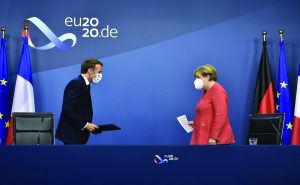European Union COVID-19 Relief Package
For five days, European heads of state and government from 27 member states of the European Union have been meeting in Brussels. This Special European Council meeting was an important milestone for the recovery of Europe following the COVID-19 pandemic crisis. The proposal took several days of intense negotiations and the post-coronavirus recovery package illuminated strains between EU leaders.

At its conclusion, the leaders agreed to a establish an €750 billion fund to assist European member states to recover from the economic impacts of the Covid-19 pandemic. To fund this initiative, the European Commission will borrow this money from financial markets and will assign €390 billion of the funds as grants to those EU countries with the most significant challenges while the remainder of the money will be distributed in the form of loans.
The leaders at the meeting also agreed to a new EU budget of €1.1 trillion for the next six years with the equivalent spending power of €1.8 trillion.
The 27 member states, joined by Charles Michel, president of the European Council, and EU Commission President, Ursula von der Leyen, worked intensively to broker a final deal. So involved were the summit meetings that leaders decided to abandon video conferences in favor of in person meetings.
The giant aid package is needed because not since the aftermath of the Second World War has Europe been so badly damaged economically and a collective response was needed to the coronavirus calamity. There were some fundamental differences between member states and a major issue was how much latitude should be given to recipient states in terms of how the allocate the funds provided. Some countries wanted guarantees on political, environmental and social reforms and demanded conditions to the rule of law in some states.
Chancellor Angela Merkel of Germany, whose nation recently took over the European Union’s rotating presidency, was once again a major force at the meetings and worked to with other leaders to arrive at a deal.
The deadlock was centered around the proposal of the so-called “Frugal Four” — Austria, Denmark, Sweden, and the Netherlands — which are wary of pooling debt with less solvent countries and do not want a bailout approved without strict conditions. Countries such as Spain and Italy have seen their economies deeply affected. Dutch Prime Minister Mark Rutte, was the most vocal opponent of the deal in the absence of concessions.
Germany Chancellor Angela Merkel found herself in the unusual position of aligning with Europe’s southern states against the Frugal Four, this despite her past history of hard-line fiscal prudence during the long-running European debt crisis. But given Brexit and the United Kingdom’s departure from the EU and with populist anti-Euro parties on the rise, Merkel understood that these are delicate times requiring unity and solidarity of member states. Both French President Emmanuel Macron and Chancellor Merkel have been the driving force in the rescue package process.
In giving their approval to this deal, the leaders of the EU have given their approval to a plan for that is unprecedented in scale.
The new Multiannual Financial Framework (MFF) will be in place between 2021 and 2027 and will implement the recovery package to tackle the socio-economic consequences of the COVID-19 pandemic.
There is also action taken on climate change with 30% of the total expenditure from the MFF aimed at climate-related projects to comply with the EU’s objective of climate neutrality by 2050, the EU’s 2030 climate targets and the Paris Agreement.
There were political considerations given the enormous amount of money that will be spent on the recovery including the fact that Italy and France have elections next year and it is hoped that this package of solidarity among member states will decrease the support of anti-European parties. This was a major step forward for the recovery of Europe and hopefully lessons learned there can also be replicated in Canada.
Dr. Mario Silva, PhD (law), Distinguished Fellow, Ryerson University





Redes Sociais - Comentários